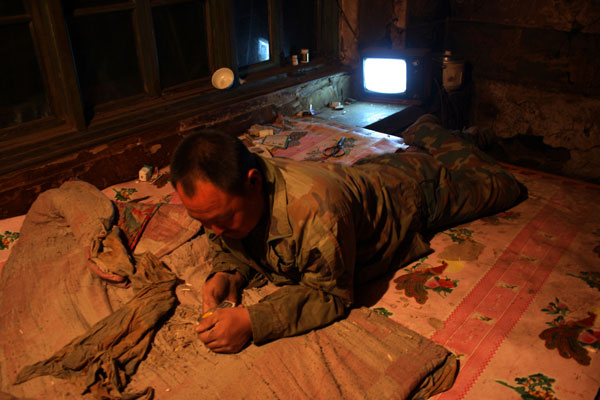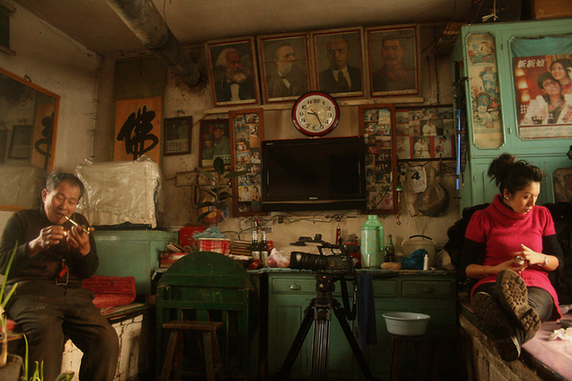Documenting China through ordinary people's lives
- By Pang Li
 0 Comment(s)
0 Comment(s) Print
Print E-mail China.org.cn, February 9, 2012
E-mail China.org.cn, February 9, 2012
China is so large and populous that it cannot possibly be accurately or completely portrayed in only one or two films. A series of documentaries, however, can do a fair job.
At this year's International Film Festival Rotterdam, 17 documentaries by Chinese filmmakers were shown as part of the festival's "Signals: Hidden Histories" section. Through the lives of workers, middle school teachers, an old man, a brothel owner, an artist and various government officials, among others, the documentaries give interesting and insightful perspectives on Chinese society and some of the directors prove themselves to be rare talents.
|
|
|
A still from "Bachelor Mountain" |
Of all the documentaries, Yu Guanyi's "Guanggun" (Bachelor Mountain) impressed me most. The Chinese word Guanggun literally means "bare stick" and is synonymous with unmarried men. In the movie, the word refers specifically to San Liangzi, a 46-year-old man living in a village in northeast China's Heilongjiang Province. San has remained single since his wife left him twelve years ago.
The film shines a light on the exodus of young people from rural areas, which is the negative side of China's urbanization process. With most of the local young women, including San's ex-wife, moving out to towns and cities for jobs, San struggles with the task of finding a suitable woman to marry. Only one single woman remains in San's village: A tomboy-type for whom he has harbored unrequited feelings for ten years.
Yu Guanyi's camera follows San everywhere and gives a human and touching portrayal of San's salt of the earth character. The film shows San's solitary existence working as a part-time logger. But he never complains. He even refuses to take a better-paid job in order to stay at his love's side. Despite the fact that his odd jobs afford him few comforts aside of his shabby house, simple food and ragged clothes, he displays no anger and endures everything with quiet fortitude. He could be taken as a metaphor for the noblest qualities of China's rural population: hard-working, kind-hearted, submissive and modest. These qualities serve to arouse the audience's compassion for the leading character.
In the film, San and other characters show their personalities mainly through their actions rather than empty words, making the film very convincing. Meanwhile, Yu Guangyi's highly skilled editing lends the film a smooth-paced coherence. The Chinese filmmaker's third film is a definite tour de force following his previous efforts, "Mu Bang" (Timber Gang) and "Xiao Lizi" (Survival Song).
|
|
|
A still from "Lao Tangtou" (Shattered) |
Another very interesting film in the section was Xu Tong's "Lao Tangtou" (Shattered), a documentary about the Tang family and the conflict between the family members. The film tells the family's history through the recollections of the patriarch and the lives of his daughter, who used run a brothel, and his son. In this way, it reflects the changes that China has undergone over the past few decades.
The film, however, lacks subtlety. It conveys more through the words of its daring, outspoken characters than through their actions. It actually feels like an edited collection of interviews, and this shortcoming reduces the film's power as well as its social value as a documentary.








Go to Forum >>0 Comment(s)